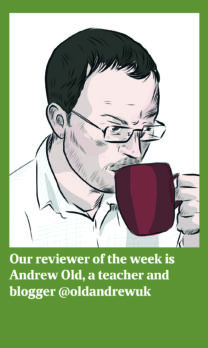Reviewer Andrew Old shares the best of the edu-blogosphere this week.
The “quite tidy garden” . . . or why level descriptors aren’t very helpful
By @HeatherBellaF
Do level descriptors provide useful feedback? Probably not, according to this post by Heather Fearn, the curriculum director at Thetford Academy, Norfolk. She imagines giving her gardener instructions in the same style as the way we give students advice, telling him that he needs to move the garden along from “a little overgrown” to “well-tended”, rather than saying what needs to be done.
PowerPoint
By @jo_facer
Judging by the response on Twitter, this call for teachers to refrain from using PowerPoint is probably the most controversial blogpost of the week. Does its use distract from teaching, while confining students to a darkened room? English teacher Jo Facer thinks so.
Please, no more rubbish about times-tables!
By @jemmaths
Jemma Sherwood argues that knowing your times-tables is a vertebra in the spine of mathematical knowledge. As well as arguing that fluency with times-tables supports the learning of other knowledge, she also addresses the arguments people have given against times-table tests at the end of primary school.
Teach First career change
By @joannecrossley
We often think of Teach First as training recent graduates, so I was interested to hear about this teacher who worked as a barrister for 20 years before deciding to start training to become a teacher. She describes how tough it was to cope with a new career later in life, but is positive about her choice. “Now that I’m starting to find my feet, I think that this is the best decision I’ve ever made. It’s too early to say whether my pupils feel the same.”
There is the curriculum, and then there is the “other” curriculum
By @iQuirky_Teacher
It’s often assumed that traditional teaching is only concerned with academic outcomes, and not with making students better people or developing character. This post argues that the two goals are not in competition, and that studying helps to make one a better person, by teaching self-control and the value of hard work. “At the end of the day, this is all about the development of scholarly disposition in children and the celebration of all things scholarship.”
Papers Society
By @mathsjem
Maths teacher Jo Morgan describes her
efforts to change her attitude to doing practice papers before maths exams. She
set up her own “Papers Society” where students come to practise exam papers after school: “. . . it seems to be a very successful initiative for increasing the amount of exam preparation my students are doing from earlier in the year, so I thought I’d share it here in case other teachers want to try the same thing.”
Structured revision lessons using retrieval, spacing and interleaving
By @MissDCox
Another post on supporting students with revision activities, this time by RE teacher Dawn Cox. She is sceptical about the ability of students to organise their own revision effectively and uses principles from cognitive science to design revision sessions that ensure students revisit the same topics at suitable intervals and practise retrieving the relevant knowledge.
Studying with distractions
By @PsyDocCindy
Another post about applying cognitive science to studying appeared on the Learning Scientists blog. It answers the question of whether we can study effectively if people are talking around us. The (unsurprising) answer is that we don’t learn as well when we are distracted. But what is more unexpected, is that research suggests that this effect is more severe when we are studying something easy, than for something difficult.













Your thoughts